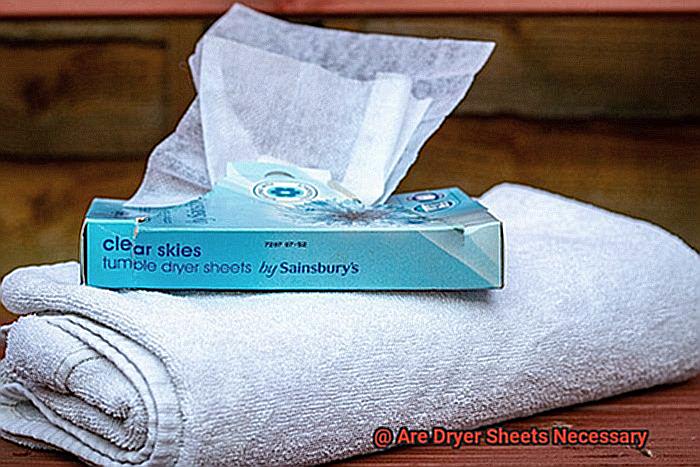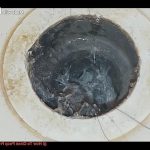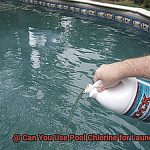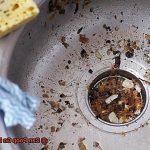Do you ever find yourself frustrated with static cling or a lingering odor on your freshly laundered clothes? Enter the trusty dryer sheet. These little wonders promise to eliminate static, leave your clothes smelling fresh, and make them feel soft to the touch. But are they really necessary for achieving that perfect load of laundry?
While some swear by dryer sheets, others argue that they’re just an unnecessary expense. In this post, we’ll delve into the science behind how dryer sheets work and explore some of the potential downsides of using them. We’ll also take a closer look at natural alternatives that will leave your clothes just as fresh without any added chemicals.
Whether you’re looking to go green or simply save a few bucks on your laundry routine, this post is for you. Together, we’ll explore the world of dryer sheets and determine if they truly deserve a spot in your laundry arsenal. So let’s dive in and discover if dryer sheets are really necessary or if it’s time to say goodbye once and for all.
Contents
Benefits of Dryer Sheets
If not, you might want to consider the many benefits they offer. Not only do they reduce static cling and soften fabrics, but they also provide a range of practical solutions that make them an essential part of many households.
Did you know that dryer sheets can repel certain pests? The strong scent of the chemicals used in dryer sheets can deter mosquitoes and gnats, making them perfect for outdoor activities. Simply attach a sheet to your clothing or place one in your pocket to keep these pesky insects at bay.
But that’s not all – dryer sheets can also be used to remove soap scum and other residues from shower doors and glass surfaces. Wet a used sheet and scrub away build-up for a streak-free shine. And if you’re looking to freshen up smelly shoes, simply place a sheet inside each shoe overnight.
Dryer sheets are not just limited to the laundry room. They can be placed in drawers or closets to keep clothes smelling fresh between washes. Some people even use them as a quick and easy way to clean baseboards or remove pet hair from furniture.
It’s important to note that some people may be sensitive to the chemicals used in dryer sheets, and there are valid environmental concerns surrounding their use. However, when considering the many benefits they offer, it’s worth taking a closer look at how dryer sheets can be a useful tool in your household routine.
Reducing Static Cling with Dryer Sheets
It’s undoubtedly frustrating, but dryer sheets aren’t the only solution. There are eco-friendly and effective alternatives that can achieve the same result without relying on chemicals or producing unnecessary waste.
One solution is adding half a cup of white vinegar to your rinse cycle. The acidity of the vinegar reacts with any leftover alkaline detergent residue, neutralizing it and preventing static buildup. It may sound strange, but this method is highly effective.
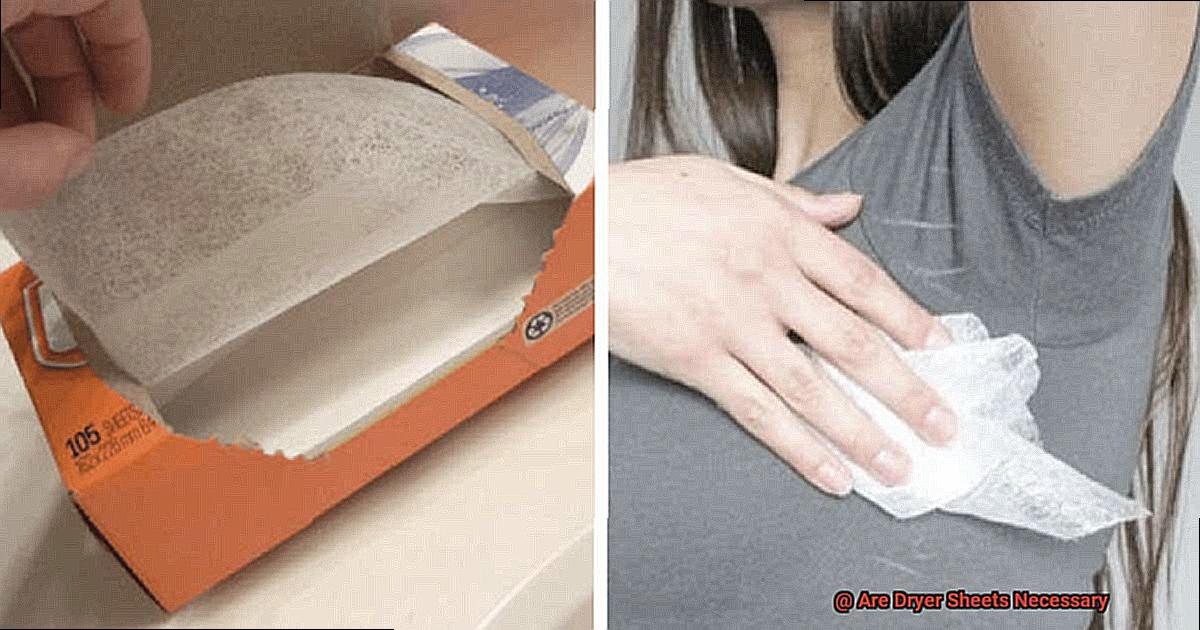
Another option is wool dryer balls. These reusable balls made of natural wool work by separating your clothes and allowing air to circulate more freely, which reduces static cling. Plus, they’re eco-friendly and save you money in the long run.
Lastly, air-drying your clothes is a great way to reduce static cling and save energy at the same time. This method also helps prolong the life of your clothes and reduces the likelihood of shrinking or damage.
While dryer sheets are a popular solution for reducing static cling in clothes, they aren’t necessary. By trying out these alternatives, you can combat static cling effectively while being eco-conscious.
Adding a Fresh Scent with Dryer Sheets
Look no further because there are many eco-friendly alternatives available that will leave your laundry smelling amazing.
One of the best ways to add a fresh scent to your laundry is by using essential oils. It’s easy. All you have to do is add a few drops of your favorite scent to a damp washcloth or piece of fabric and toss it in the dryer with your clothes. As the heat from the dryer circulates, it will release the aroma from the oils and spread it throughout your laundry. This method not only allows you to customize the scent to your liking, but it is also safer for your health.
Another alternative is using wool dryer balls. These reusable balls help reduce static cling and soften fabrics without any harsh chemicals. To add a fresh scent, simply add a few drops of essential oil to the wool balls before tossing them in the dryer. Say goodbye to harmful chemicals and hello to amazing-smelling laundry.
If you prefer a more natural approach, air-drying your clothes is also an excellent option. Not only does this save energy, but it also prolongs the lifespan of your clothes while allowing them to retain their natural scent. The fresh smell of clothes that have been hung out to dry in the sunshine is unbeatable.
So, there are numerous eco-friendly alternatives for adding a fresh scent to your laundry without relying on conventional dryer sheets. From using essential oils and wool dryer balls to air-drying your clothes, these methods are safer for your health and better for the environment.
Potential Environmental Concerns of Dryer Sheets
Dryer sheets contain chemicals such as synthetic fragrances, quaternary ammonium compounds (QACs), and silicone oils. These chemicals are released into the air when dryer sheets are used and contribute to indoor and outdoor air pollution. Synthetic fragrances made from harmful chemicals like phthalates can cause hormone disruption and reproductive problems. QACs are toxic to aquatic life and can contribute to antibiotic-resistant bacteria. Silicone oils can accumulate in the environment and harm wildlife.
But wait, there’s more. Dryer sheets are made from non-biodegradable materials like polyester, which means they take years to break down in landfills and contribute to waste and pollution in our environment.
So what can we do? Eco-friendly alternatives like wool dryer balls or reusable fabric sheets are becoming increasingly popular among consumers. These options are made from natural materials and don’t contain harmful chemicals, making them a safer and more sustainable choice for those concerned about the environment.
In conclusion, while dryer sheets may provide benefits for reducing static cling and adding fragrance to laundry, their negative environmental impacts should not be ignored. As consumers, we should consider eco-friendly alternatives and weigh the pros and cons of using dryer sheets.
Personal Sensitivities to the Chemicals Used in Dryer Sheets
Dryer sheets contain synthetic fragrances, surfactants, and fabric softening agents that can cause skin irritation and respiratory problems for some individuals. It’s like having a cloud of toxins in your dryer. Synthetic fragrances, which are made up of various chemicals, are one of the primary culprits in causing sensitivities. Think of it like a beautiful bouquet of flowers that has been sprayed with harmful pesticides. When we use dryer sheets, these chemicals are released into the air, and we can inhale them, leading to respiratory issues or headaches.
In addition to synthetic fragrances, quaternary ammonium compounds (quats) are commonly found in dryer sheets. These chemicals may serve as fabric softeners and anti-static agents, but they have been known to cause skin irritation and allergic reactions in some people.
If you have sensitive skin or underlying health conditions, it is wise to steer clear of dryer sheets altogether. Just like avoiding a bee sting if you’re allergic to bees. Fortunately, there are many natural alternatives available that can provide similar benefits without the use of harmful chemicals. Wool dryer balls or vinegar can effectively work as natural fabric softeners, while essential oils can add a pleasant fragrance.
Alternatives to Using Dryer Sheets
Many people have been using dryer sheets for years without realizing there are alternatives available. Lucky for you, we’ve got you covered with some cost-effective and eco-friendly options that will leave your clothes soft and fresh-smelling.
Firstly, let’s talk about dryer balls. These balls, made of wool or plastic, bounce around in the dryer separating clothes and allowing hot air to circulate more efficiently. They not only reduce drying time but also soften clothes without the use of chemicals. Plus, they’re reusable, which means they’ll save you money in the long run.
Another alternative to dryer sheets is using vinegar in the rinse cycle. Adding a cup of white vinegar to the rinse cycle can help remove static cling and naturally soften your clothes. Don’t worry about the smell of vinegar because it will dissipate after drying, leaving your clothes smelling fresh and clean.
If you want a fresh scent without using chemicals, essential oils are an excellent alternative to dryer sheets. Adding a few drops of lavender or lemon essential oil to a damp washcloth and tossing it in the dryer can give your clothes a delightful aroma without harsh chemicals. Additionally, essential oils have many benefits for your health and well-being.
Lastly, line drying your clothes is an excellent way to eliminate the need for dryer sheets altogether. This method not only saves money on energy bills but also helps reduce emissions from your household appliances.
B5fJSPkKJ1Q” >
Conclusion
In conclusion, the answer to whether dryer sheets are necessary is not a simple one. While they do offer benefits like reducing static cling and adding fragrance to laundry, there are also potential downsides to consider. For instance, dryer sheets contain chemicals that can harm the environment and cause personal sensitivities in some individuals.
Fortunately, there are plenty of eco-friendly alternatives available that can achieve similar results without relying on conventional dryer sheets. From using wool dryer balls or vinegar to air-drying clothes or adding essential oils, these alternatives are safer for your health and better for the environment. By exploring these options, you can reduce your carbon footprint while still enjoying soft, fresh-smelling laundry.

